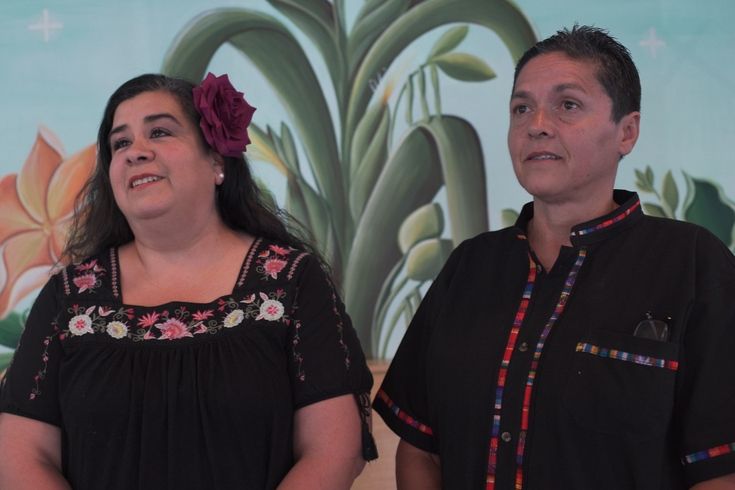How Lilia and Silvia Beat the Banks

“Banks don’t believe in food trucks,” says Lilia Avila.
To the banks, it didn’t matter that business at the Fiesta Mexican Food Truck was booming. Demand for their catering events and homemade salsa was overwhelming, but their food trailer was too small to keep up. They wanted to upgrade. “But we didn’t have enough money for a down payment, so everyone was closing the doors on us,” says Lilia.
In their spare time, Lilia and her partner Silvia Ochoa were catering for so many weddings, quinceaneras and reunions, they decided to open an official food business of their own. In 2016, they took a risk and bought a food trailer. As business took off, they quickly became aware of how much there was to learn.
Though they were known for their complicated and intricate recipe to make Albuquerque’s best barbacoa, Lilia says, “We didn’t even know how to turn on a computer!” They were teaching themselves accounting, wholesale ordering and marketing. “We didn’t know anything. We were looking for help,” she says.
Their families were not as excited about the possibilities as Lilia and Silvia were. Food trucks and trailers are not only high-risk (with about a 60% success rate after three years), they’re also labor-intensive. “Many family members discouraged us because they thought this was a man’s job,” says Lilia. “But we didn’t let anyone get in our way. We were very motivated and determined.”
The trailer needed a new stove and a better ventilation system, but the women were turned down over and over at the bank. “All we wanted was $2,000 for a stove. But they couldn’t even give us that, or tell us why. They would only say, ‘You don’t qualify.’” Lilia and Silvia took up roofing, housekeeping, landscaping, baby sitting, “anything to save money on the side for more equipment,” Lilia says.
That’s when they enrolled at the Street Food Institute, a nonprofit dedicated to helping people own and operate a successful foodservice business. There they learned the nuts and bolts of food entrepreneurship. The support and community they found was an enormous relief, says Lilia. “They taught us so much. And still today, any issue I have, I can call and say, ‘Help! I need to send an invoice!’ And they’re there to advise us.”
Additionally, Street Food Institute sponsored Lilia and Silvia for a Co-op Capital loan through Nusenda Credit Union. The funds allowed the women to fix the trailer stove and ventilation, and add a commercial cooktop to expand catering. Almost overnight, they increased revenue five fold. “We went from making $100 a day, to $500 a day,” Lilia says.
“The Co-op Capital program flips the traditional lending model,” says Robin Brulé, Senior Vice President of Community Relations at Nusenda Credit Union. “This allows lending to be based on trusted relationships between people and organizations — like Street Food Institute and Lilia and Silvia — rather than the traditional determinants of credit worthiness, like credit score or capital.”
“Relationship-based lending works, Lilia and Silvia prove this,” says Sandra Ortsman, a capacity manager for Co-op Capital.
Once the momentum took hold, the women have powered forward, securing a spot in the first cohort of Three Sisters Kitchen’s Food Entrepreneur Training Program, winning awards for their homemade salsa and making preparations to sell packaged products in local stores.
Unlike other food entrepreneurs, Lilia and Silvia graduated from both the Street Food Institute and Three Sisters Kitchen programs. Stacking of these trainings has better prepared the Fiesta Mexican Food Truck business for expansion. And the way these two programs work together to support entrepreneurs like Lilia and Silvia is no accident.
“The team at the Street Food Institute helped us focus and differentiate our trainings,” says Anzia Bennett, director of Three Sisters Kitchen. “Running a product line is so different from running a restaurant, permit and process-wise. We’re filling the gaps in the ecosystem in a complementary way, and being thoughtful about what supports food entrepreneurs need most.”
Upon graduating from Three Sisters Kitchen last month, Lilia and Silvia are now eligible for a second Co-op Capital loan (Both Three Sisters Kitchen and Street Food Institute are Co-op Capital partners). And the timing couldn’t be better, Lilia beams, because they just paid off their first one, “early!”
“They’re the perfect borrower,” says Vanessa Roanhorse, a capacity manager for the Co-op Capital program. “They might not have looked like that on paper...but that’s why Co-op Capital is so important. Albuquerque would have missed out on this amazing food business if Lilia and Silvia hadn’t been given the chance.”
The impact of the program is expected to continue growing. Just last week, Co-op Capital received a highly competitive grant award of $250,000 from the U.S. Small Business Administration (SBA) to build the capacity of organizations that are integrating and deploying Co-op Capital loans.
Connect the Dots
Through City Alive, Albuquerque leaders commit to collaborating, sharing ideas and taking action to better support the prosperity of homegrown businesses across our city. The Co-op Capital loan program emerged and has continued to grow through City Alive. Led by Nusenda Credit Union, Co-op Capital partners with community organizations like Street Food Institute and Three Sisters Kitchen to provide underserved communities the capital they need.





